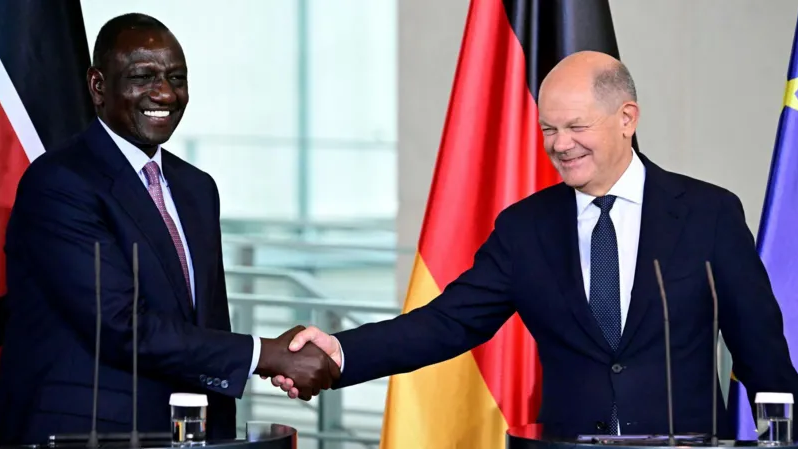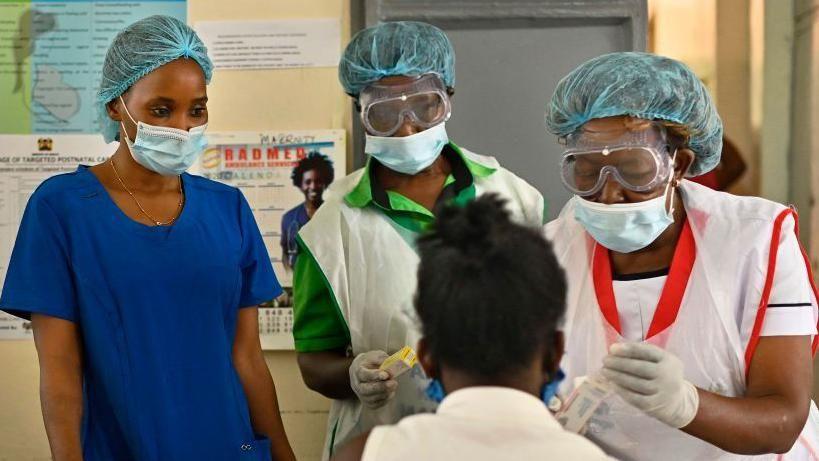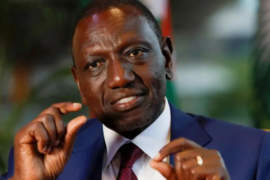
Germany don agree to open dia doors to 250,000 skilled and semi-skilled Kenyan workers in wetin dem call, controlled and targeted labour migration deal.
Kenya dey struggling wit increasing difficulties to provide work and enof money for dia young professionals, while Germany dey face shortage of skilled labour.
Dem don already welcome five Kenyan bus drivers to Flensburg, in di north of Germany, in di pilot project.
Migration agreement na key part of di goment of Germany efforts to reduce immigration.
- Di 11 spacewalks wey make history
- ‘Victims of Maiduguri flood no fit be less dan two million’ – Govnor Babagana Zulum
- South Africa president sign BELLA Bill into law – all you need sabi about am
Di agreement go also simplify di repatriation of Kenyans wey dey Germany without legal permission.
Immigration na big issue for Germany at di moment, sake of di rise in popularity of di far-right anti-immigration party, Alternative for Germany (AfD).
Bifor goments for Berlin bin allow relatively large numbers of asylum seekers to settle for di kontri in recent years.
Germany bin take in more dan one million pipo, mostly wey dey run from war for kontris like Syria, during di 2015-2016 migrant crisis, and dem don receive 1.2 million Ukrainians since Russia war start for February 2022.
Germany Chancellor Olaf Scholz and Kenya President William Ruto sign di labour deal for Berlin.
Germany agree to relax some of dia immigration laws to enable Kenyans to find employment for Europe biggest economy.
Authorities for Berlin go also consider to extending temporary residence permits for Kenyan workers wey don secure approved job.
Dem go also issue Kenyans wit long-term visas to study or do vocational training for Germany.

“Once di long-stay visa expire, Kenyans fit receive a temporary residence permit for study purposes for Germany for up to two years,” di agreement tok.
Dem fit extend di temporary residence permit if di dem neva yet achieve di purpose of but e dey achievable within a “reasonable” period, dem add.
According to di deal, IT specialists from Kenya go dey allowed to enter and work for Germany, even if dem no get formal qualifications.
Both goments go support di immigration of skilled workers wey don finish vocational training or earn a university degree, as long as dia qualifications dey recognised by di relevant authorities of di oda party.
Di deal also include provisions for di readmission and return of citizens between di two nations.
Dem release guidelines to prevent and fight against labour exploitation, forced labour and human trafficking.
Schleswig-Holstein Transport Minister Claus Ruhe Madsen say Germany dey in need of hard-working hands and clever minds dem tok dis one as dem welcome five Kenyan drivers for Flensburg on Thursday.
“We simply need to position ourselves for Germany in such a way wey go make hia attractive for pipo to come,” Oga Madsen add put.
Di drivers na di first batch of Kenyan workers, wey Aktiv bus company go train for dia pilot project, wit di hope to get job for Germany.
Doctors, nurses and teachers dey among those wey dey expected to take part for di programme.
Di International Labour Organisation (ILO) say di deal dey expected to significantly increase access to decent foreign jobs for Kenyan workers wey dey Germany and address labour shortages for Germany.
“It include mechanisms to protect di rights and welfare of Kenyan migrant workers for Germany, ensuring safe, orderly, and productive migration,” ILO add put inside statement.
But concerns dey about brain-drain for Kenya wit professionals like doctors and nurses wey dey go abroad for jobs, dis go leave local hospitals wit huge shortage of medical workers.
“E dey sad say we dey go service oda kontris at di expense of our own kontri,” Ekuru Aukot, one Kenyan lawyer and politician, tell BBC Newsday programme.
But Roseline Njogu, one senior foreign affairs official, say Kenya dey simply respond to di global labour market demands.
“We get a youth bulge in Kenya and every year we get a million pipo wey dey join di local labour market. E dey take time and resources to create job opportunities back home,” she add.









